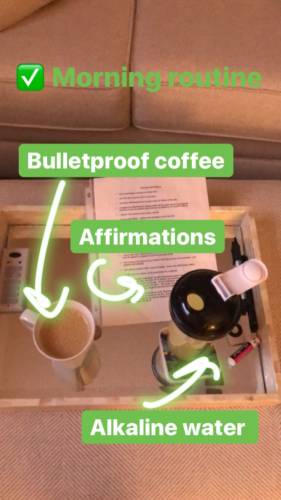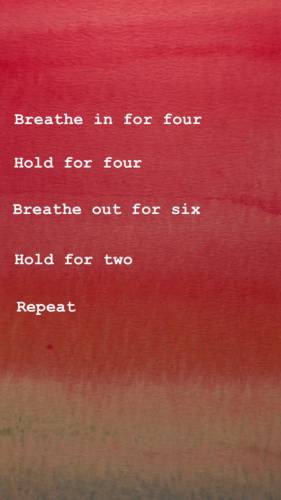 What’s your current morning routine look like? Hit snooze (then again, and again), spring out of bed at the last possible second and then race around like mad, just to sit in traffic for 20-30 minutes? Or wake up, make breakfasts, lunches and prep the rest of your family for their day while putting your needs last? Waking up is often the most stressful time of day for a lot of people. But what if it didn’t have to be this way? What if your morning could be your most precious time, your most cherished time and could be leveraged to deliver exponential returns on your happiness throughout your whole day.
What’s your current morning routine look like? Hit snooze (then again, and again), spring out of bed at the last possible second and then race around like mad, just to sit in traffic for 20-30 minutes? Or wake up, make breakfasts, lunches and prep the rest of your family for their day while putting your needs last? Waking up is often the most stressful time of day for a lot of people. But what if it didn’t have to be this way? What if your morning could be your most precious time, your most cherished time and could be leveraged to deliver exponential returns on your happiness throughout your whole day.
Think about your weekend mornings: you take your time getting up the time to get up, and if you do get up early, it is in order to do something that you love to do (i.e. hike, read, etc.). It’s not the morning that you hate; it’s what you do in the morning that you hate.
It’s no secret that some of the most successful people in the world are early risers. If this is new to you, take a look here. There is clearly a positive correlation between early risers and success. For me personally, the dividends on a concerted morning process are tremendous: more patience, more peace and more of a defense for the day. I’ve pre-paved any stressful or important interactions and for me, that makes all the difference.
Mornings are for Miracles
Part of my monthly wellness challenges is a personal development piece. It’s sort of like a book club meets a fitness group (and arguably the internal work is as important or moreso than the physical changes). In the fall, we all read and practiced Hal Elrod’s best-selling book The Miracle Morning. In the book, Hal goes into his findings from studying the most successful people’s morning routines. He takes note of six different activities many of them do and calls them “SAVERS.” Many successful people practice at least four of six of these activities, but rarely do all six. So what happens if you do all six? That’s for you to find out.
Pre-Routine
First things first. When your alarm clock goes off, GET UP! This is important. Your sleep cycles are roughly 75-90 minutes long and if you hit snooze and go back to sleep, you initiate another cycle. If you try and get up before that time, you WILL be more tired and groggy. (If you struggle here, or are a procrastinator in general, I highly recommend reading The 5 Second Rule by Mel Robbins). Then, drink water because you are dehydrated. Remember, you’re shooting for half your body weight in ounces per day. After you have chugged your water, go take a shower (or wash your face), brush your teeth, and mouthwash. Psychologically, there is something about taking a shower and brushing your teeth that tells your body that you are awake for the day.
Now you are ready to start your miracle morning!
The Routine (SAVERS)
Hal Elrod coined the acronym “SAVERS” to help us remember each aspect of the ideal morning routine. Perhaps you do a few of these already, but why not try them all? Here is the list:
- Silence/Meditation
- Affirmation
- Visualizations
- Exercise
- Reading
- Scribing
As an example, I will take you through my miracle morning. It may seem extraneous but I will tell you, it works. If you give it a fair shake, you will find you are making appreciable progress towards goals and aligning you daily life with your larger goals.
So, now that you know the impact the miracle morning has, let me give you an example of my routine.
My Morning Routine
1. Silence/Meditation (10-20 Minutes)
The first thing I do is meditate for 10-20 minutes. Sometimes I’ll listen to a guided meditation and sometimes I do breathwork and sometimes I use a process called 6 Phase by Vishen Lakhiani (outlined in his book Code for the Extraordinary Mind). There’s also a playlist on Spotify called “10 minute meditation” and lots on YouTube (I love this 60 min background from Wayne Dyer and this 15 minute one by Esther Hicks. This helps me stay calm, focused, and concentrating throughout the day. If you’re questioning the effects on meditation, you can check out all of the benefits here.
2. Scribing/Journaling (5 Minutes)
First, I am definitely least consistent with this piece. I will often do it at night and it is basically a gratitude list. Three to fives items per day. Yes, this can get repetitive and you might start appreciating really small things. It puts a positive perspective to start your day and reminds you that all of the things you have right now are, well, great!
You can also write down three things you’re working on improving. Can’t think of anything? Could your spending habits improve? How about fitness or dietary habits? Anything at work or in your family life that you can improve upon? I am sure you can think of something.
You can also write down three goals that I would like to accomplish for the day and make sure that these are aligned with your weekly, monthly, and annual goals.
3. Affirmations or Prayer (5 Minutes)
As Napoleon Hill is famous for saying, “Anything you can conceive and believe, you can achieve.”
Affirmations are the simplest form of prayer. Repeating my goals to myself causes my brain to subconsciously focus on them throughout the day. You will be surprised how things tend to fall into your lap, allowing you to easily accomplish your goals.
I personally have a list of personal affirmations (who I want to be, what I want my life to look like) and business ones (what does my work life feel like, who’s there, what goals do I have in that arena). It’s important that these FEEL real and achievable. The feeling UNDER the affirmation will always seep through and if you don’t believe you can achieve it, it’s undermining. You can always use qualifiers like, “More and more I..,” “I love when….,” “I love how it feels when..,” “It excites me that..,” “I love seeing myself..”
4. Visualizations (5 Minutes)
Visualizations are similar to meditating. The difference? In meditation, you do your best to think about nothing except your breathing. In visualization, you envision yourself accomplishing your goals. Get a sense of what it feels like, attach some emotion to it. You might find that inspiring music helps here, or doing it immediately after your gratitude list.
Some people create a bulletin board and pin pictures of their desires to the board. I personally shut my eyes and visualize myself achieving both my short (daily or weekly) and long-term(1-3 years) goals. This keeps the fire burning.
5. Reading (15-30 Minutes)
I’ve always loved to read, and after graduate school, it was such a relief to read for pleasure again. I read mostly nonfiction and a lot of personal development, but rotate in some fiction when I need a little healthy escapism. I generally listen to Audible to and from work, and then read at night before bed. Car time is great for books or lectures (or your meditation music if you’re prone to road rage).
6. Exercising (30-60 minutes)
Maybe this means going for a morning run before the sun wakes you. For me, I have found a lot of freedom in short (sometimes 45-60 min but mostly 30min) at home workouts from a digital library. There’s tons to choose from (pilates, yoga, HIIT, MMA, tai chi) and I never get bored. There’s no commute, no one watching and they’re quick and effective.
Conclusion
While this may seem like a lot (and admittedly, some days my morning process looks like SAVE or even SVE), my suggestion would be to try to wake up 30 minutes earlier and do all of the SAVERS for 5 minutes each. As you become more comfortable waking up earlier and you begin to want to spend more time in your miracle morning, you can extend it to one hour, two hours, etc. Before you know it, you will be a super early riser and will be able to get more done before 8:00 a.m. than most people accomplish in a week!
Would you consider waking up earlier to adopt some of the SAVER habits? Why or why not? Let us know!




